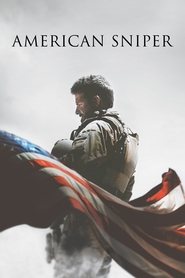Eastwood’s usual visual liabilities—his underpopulated settings, his point-and-shoot staging of already dramatically obvious confrontations—serve him in a film that […] thrives on a language of barrenness. […] American Sniper boils each of Kyle’s four tours down to a series of sharp, succinct western-movie-like stanzas that are periodically complemented by domestic life and by the sort of foreshadowing tough-guy chatter that was already old hat in the late days of John Wayne. […] This film represents one of Eastwood’s most convincing assertions of an often troubling and hypocritical theme in his work: that heroism is a construct carried by people who bear the accompanying burden of a great undertow of alienating sadness.
— Chuck Bowen (Slant)
If Kyle were alive, one wonders what he would have made of the film — especially when Eastwood shows him staring at a TV, rattled by flashbacks triggered by the very type of war movie he’s starring in. […] The humble Kyle onscreen is Kyle with his flaws written out. We’re not watching a biopic. We’re watching a drama about an idealized soldier, a patriot beyond reproach, which bolsters Kyle’s legend while gutting the man. […] The popularity of […] military martyrdom movies proves that they speak to millions of Americans, many of whom served or loved people who did, and watch in search of an answer to a question that’s hard to ask: Was the sacrifice worth it? The answer these audiences want to — need to — hear is yes. And these fictional versions of Chris Kyle and Marcus Luttrell assure us that it was. […] Eastwood is too tongue-tied to prevent this unexamined jingoism from echoing through the multiplex. Instead, Eastwood simply steps back and allows American Sniper to play like heartland bingo, in its opening minutes paying homage to guns, football, hunting, Bibles, Lone Star beer, and rodeo cowboys. Here are things worth defending, says Eastwood. Then he crosses his fingers and hopes he’s said enough.
— Any Nicholson (Village Voice)
As redundant as the action scenes become, they’re far preferable to the dreary domestic conversations, which rehearse only the most rote troubles afflicting military families. And bordering on offensive is the film’s assertion that some soldiers can overcome PTSD in a matter of months through good acts and willpower. [Many] scenes will be read as problematic by the soft-hearted (like myself) and admirable (or cathartic or sexy) by others. What makes American Sniper such a deeply unsatisfying film, though, is that Eastwood recuses himself by and large from delivering a judgment. Perhaps the ambiguity regarding Kyle’s unexamined nationalism and chest-thumping manliness merely reflects the dividedness of the country on social mores, but, like the ubiquitous Punisher skulls on Kyle’s troops’ tanks, it’s not clear whether it’s meant to be disappointingly juvenile or fearsomely awesome.
— Inkoo Kang (The Wrap)
Too much of American Sniper is standard-issue military service movie, from the abusive training sequences to the standard operating procedure of house searches, dusty firefights and bodies dropped like a rising score in a first-person-shooter video game.
— Roger Moore (Movie Nation)
Also worth reading is the three paragraphs of MovieGenius's LetterBoxd review starting with "Peter Pan …".
Synopsis: U.S. Navy SEAL Chris Kyle takes his sole mission—protect his comrades—to heart and becomes one of the most lethal snipers in American history. His pinpoint accuracy not only saves countless lives but also makes him a prime target of insurgents. Despite grave danger and his struggle to be a good husband and father to his family back in the States, Kyle serves four tours of duty in Iraq. However, when he finally returns home, he finds that he cannot leave the war behind.

